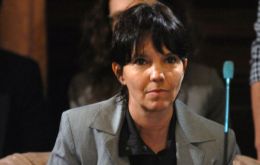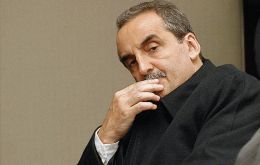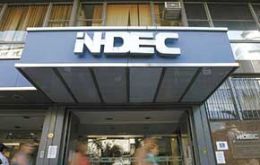MercoPress. South Atlantic News Agency
Tag: Inflation
-
Wednesday, November 21st 2012 - 20:51 UTC
Argentina with the world’s fourth highest inflation, says private bank

Argentina is the country with the world’s fourth highest inflation, behind Sudan, South Sudan and Byelorussia, according to a report from a leading Argentine bank from the City of Buenos Aires.
-
Wednesday, July 11th 2012 - 23:02 UTC
Uruguay concerned with Argentine economy growing misbalances

Uruguay’s Economy minister Fernando Lorenzo expressed concern about the deteriorating indicators from the Argentine economy which could have a negative impact on the country’s activity.
-
Saturday, June 9th 2012 - 00:37 UTC
Argentina rapidly becoming too expensive for foreign tourists

Argentina is rapidly becoming an expensive country for tourists and evidence of this is the declining number of tourists arriving in the country in the first months of the year while the number of Argentine travelling overseas is soaring, according to Mario Lielman, chair of the Buenos Aires Tourism and Travel Agencies Association.
-
Monday, March 26th 2012 - 08:59 UTC
Printing money does not lead to inflation, argues Argentine central bank president

The president of Argentina’s Central Bank (BCRA), Mercedes Marcó del Pont, stressed the importance of the recently approved bank’s charter reform and denied that printing currency leads to the creation of an inflationary state “since inflation is rooted in other causes”.
-
Friday, February 24th 2012 - 07:38 UTC
Argentina and the price of cooking the books, according to The Economist

History has left Argentines with more than their share of economic trauma. Having twice suffered destructive bouts of hyperinflation in the late 1980s, they are sensitive to rising prices. When they spot inflation their instinct is to dump the peso and buy dollars.
-
Friday, February 3rd 2012 - 18:14 UTC
Uruguay inflation up 0.74% in January and 8.05% in the last twelve months

Uruguay's inflation rate rose in January 0.74% from December as housing, hotel and restaurant prices jumped, the national statistics agency, INE, reported this week. The consumer price index rose 8.05% on the year at the end of January, INE said.
-
Thursday, February 2nd 2012 - 05:15 UTC
IMF warn Argentina on ‘lack of progress’ in addressing inflation data

The International Monetary Fund (IMF) warned Argentina about its “lack of progress” in addressing inflation data and called on the country to implement “specific measures” within the next six months to improve it.
-
Monday, January 2nd 2012 - 21:44 UTC
Venezuelan economy expands 4% in 2010 and inflation reaches 27.6%

Inflation in Venezuela during last year reached 27.6%, which is 0.7 percentage points more than in 2010, according to a preliminary report from Venezuela’s central bank. President Nelson Merentes said that the consumer prices index “was associated to the upwards pressure generated on wholesale prices by a greater dynamism from domestic aggregate demand”.
-
Friday, December 30th 2011 - 21:22 UTC
Uruguay fearing inflation drastically rises basic rate 75 points to 8.75%

Uruguay’s central bank unexpectedly increased on Friday its benchmark interest rate by 75 points from 8% to 8.75%o as policy makers admit inflation, and mid term expectations remain notoriously over the target range and price stability is the main concern in “the current socio-economic context”.
-
Tuesday, December 13th 2011 - 06:56 UTC
Uruguay monetary policy trapped between inflation or stimulating the economy

The Uruguayan central bank “Monetary Policy Committee” will attempt to balance ‘concern’ over inflation with the increasing international uncertainty when it meets next 29 December, said the bank’s president Mario Bergara.
